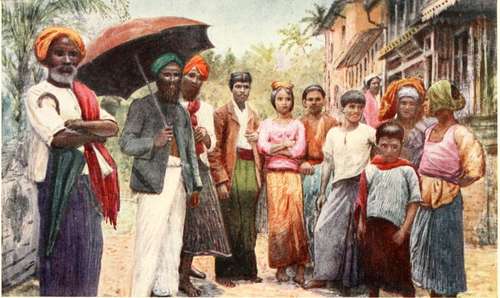Chapter V. The People (Continued)
Description
This section is from the book "Ceylon", by Alfred Clark. Also available from Amazon: Ceylon.
Chapter V. The People (Continued)
It is a strange fact that, though the sacredness of life is so strenuously insisted on in the Buddhist religion, there are about five times as many murders committed annually in the Singhalese districts of Ceylon as in Great Britain, in proportion to population.
Most of these murders are committed during family quarrels regarding the possession of land. The drinking of fermented palm-sap and of the spirit distilled from it, has been the cause of many homicides, though drunkenness is far less prevalent than in Europe. Gambling is practised a good deal, sometimes ending in knife-fights.
A marked feature of the Singhalese character is their love of litigation. They will go to law about any trifle—in one recorded case the dispute was about the two thousand five hundred and twentieth part of ten coconut-trees! They are also very prone to perjury and to the fabrication of false cases. Dreadful revelations have been made of the lengths to which malevolent men have gone in their desire for revenge.
The Tamils are, on the whole, a more law-abiding race, and are not often guilty of crimes of violence. They have often figured, however, in cases ot forgery, embezzlement, and kindred crimes, and are not a whit better than the Singhalese in the matter of perjury and false cases. The Moormen give the courts little trouble.
Charges are often made by cultured Europeans as to the supposed dishonesty, untruthfulness, and uncleanness of the natives, but it is scarcely fair that these should be judged by the high standards of such detractors. It may be safely asserted that the peasantry of Ceylon compare very favourably in every respect with the working classes in Western countries.
Natives are often said to be cruel, but it must be remembered that Eastern and Western ideas of cruelty are very different. Should a bull fall down a bank and injure itself so that it cannot rise, a European would at once put it out of its pain, but a Singhalese would be shocked by such a proceeding. He would build a shelter over the paralyzed beast, and supply it with food and water till it died, after days of agony, and consider that he had won merit by his kindness!
Bullocks may often be seen in Ceylon branded in a way which would not be tolerated for one moment in England, elaborate patterns having been burnt all over them with hot irons. Tn most cases this is done in the belief that it is the cure for rheumatic or other ailments from which the animals were suffering. The natives of Ceylon are not more cruel or callous than, for instance, Italian or Spanish peasants, who, if remonstrated with for cruelly beating their mules or other beasts, would exclaim in surprise: " What would you?—they are unbaptized things!"
As regards the charge of laziness brought against the natives, it is true enough that they have a proverb which says, " It is better to walk than to run, to sit down than to walk, and, best of all, to go to sleep!" Some allowance should, however, be made for the climate and soil of the country, which make the strenuous life unnecessary for people with so few wants.

Group Of Natives.
One very good trait of the natives is their kindness to their old folk and their love of their children.
The character of the people may be judged of to some extent by their proverbs. Here are a few current in Ceylon :
"Though the well be deep, it is only up to the neck of the frog".
" What matters it that the cat is made of clay, if it catches mice?"
"The tongue is safe, though in the midst of thirty teeth".
" The sandalwood - tree perfumes the axe that tells it".
" Like asking the thief's mother about the things lost".
Continue to:
